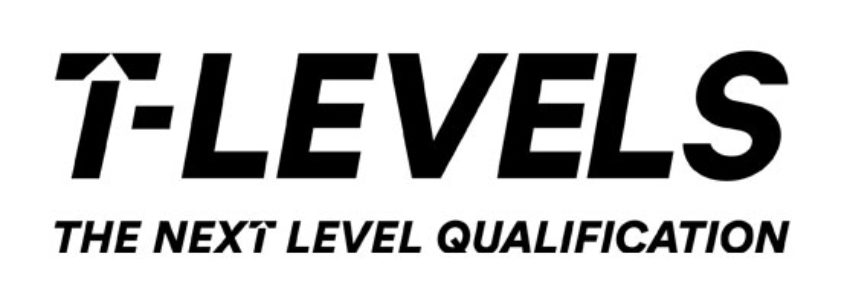T levels are a new type of two-year vocational qualification, which are the same level as A Levels, that will set you on the path to your chosen career. A key part of the qualification is an industry placement – which will help you get ready for work. They will last at least 45 days and depending on the course may be undertaken as a block or as individual days.
They are based on the same standards as apprenticeships – which have been designed by employers with the Institute for Apprenticeships and Technical Education – to make sure that young people under 19 develop the knowledge and skills required by employers after their GCSEs.
T levels started at Leicester College in September 2021 and we had our first cohort complete their qualification in August 2023 with a pass rate of 95%, overall the College had 67% pass with a merit and distinction grades, with 19% with distinction, we will be adding new T level subjects each year. Take a look at the T levels below to find out more about what you will learn, career pathways and entry requirements for the courses. For all T levels you will need grade 4 in English and maths GCSE.
| T Level | Pathway | Specialism |
| Construction | Onsite construction | Carpentry and joinery |
| Building services engineering for construction | Electrical and electronic equipment engineering Electrotechnical engineering Heating engineering Plumbing |
|
| Design and development for engineering and manufacturing | Electrical and electronic engineering Mechanical engineering |
|
| Maintenance, Installation and repair for engineering and manufacturing | Light and electric vehicles | |
| Digital and IT | Digital production, design and development | Digital production, design and development |
| Digital support and services | Hardware/Software Cyber Security |
|
| Education and childcare | Early years education and childcare | |
| Health and science | Health | Supporting the adult nursing team Supporting the midwifery team Supporting the mental health team Supporting the therapy teams |
| Management and administration | Team leadership/management | |
| Business support | ||
| Business Improvement | ||
| Legal, finance and accounting | Legal Services | Business, finances and employment Crime, criminal justice and social welfare |
If you are not quite ready to start a T level but want to start studying towards your chosen career, then a Transition Programme may be for you.
Industry placement
Successfully completing an industry placement is an important part of your course. To do so you will:
- Spend at least 45 (105 for Education and Childcare) days on placement. This can include up to 35 hours of work preparation and taster activities, such as job-shadowing or visits to different employers.
- Work with employers in real-life work settings to practice and develop your core technical and employability skills.
- Work towards specific learning goals, which will be developed by your tutor/work placement coordinator and the employer before you start your placement. Your
progress will be reviewed at regular review meetings with your tutor and placement manager.
If you are currently working part time in a paid or non-paid job which is relevant to your course and career aspirations, then you may be able to use this place of work for your placement if your employer agrees. There would still be a need for our assessors to visit to ensure competency.
Your industry placement is a great way to put your learning into practice and develop your technical skills and knowledge for the industry your placement is in. The placement is a great way to make you stand out after you have completed your course and is an important addition to your CV. It will help you to:
- Gain the experience of being in a workplace setting.
- Step out of your comfort zone and build confidence through interacting with professionals and meeting new people.
- Identify what sort of job you would like to do, and what sort of organisation you would like to work for.
- Build your network in the industry, connecting you with people who can give you advice and help you to find future jobs.
- Potentially secure a job or apprenticeship with the employer after you have completed your college course.
How are T Levels graded?
T Levels will comprise five parts. Some of these receive a grade, while others need confirmation that it has been successfully completed:
- Core component (graded A*-E), where you will learn a broad range of topics from across the whole of your chosen industry.
- Occupational specialisms (graded Pass, Merit, Distinction or Distinction* for each specialism), you will focus your learning on your chosen specialism.
- English and maths qualifications (confirmation that minimum requirements have been met), even though you will already have your maths and English GCSE (or equivalent) you will still develop these skills in the context of your chosen industry.
- Industry placement (confirmation that this has been successfully completed), we will support you to find the best placement for you, or if you have somewhere in mind let us know.
- Other mandatory requirements (confirmation that these have been met), this will include topics such as work-readiness skills and other occupational specific requirements.
Overall you will receive a grade of Distinction*, Distinction, Merit, Pass (C or above on core component), or Pass (D or E on core component).
You will be assessed in a variety of ways throughout your course, including controlled assessments, external exams, an employer-led set project, and practical assignments. this all contributes to your final overall grade of pass, merit, distinction or distinction*. If you have to resit an exam you may have to pay a fee. If this happens your tutor will explain what to do at the time.
What can you do after a T Level?
A T Level is equivalent to 3 A Levels and students who complete their T Level will earn UCAS points – currently, the maximum for 3 A*s is 168 UCAS points.
T Levels will help to prepare students to enter work with good technical skills and knowledge, or go on to to higher education if they wish to. As with all course options, students should check universities’ or colleges’ entry requirements for higher education courses.
| T Level overall grade | Equivalent A Level grade | UCAS points |
| Distinction* | A*A*A* | 168 |
| Distinction | AAA | 144 |
| Merit | BBB | 120 |
| Pass (C or above on core component) | CCC | 96 |
| Pass (D or E on core component) | DDD | 72 |
How are T Levels different from an apprenticeship?
T Levels involve more classroom study than apprenticeships. With a T Level you spend about 20% of your time in the workplace and 80% in college; whilst with an apprenticeship, you spend 20% of your time in college and 80% in the workplace.
Like A Levels, there are no tuition fees to study a T Level if you start before you are 19.
What do you need for your course and costs
On all courses you will need basic stationery such as pens, pencils, writing paper and folders. Some of your learning will be online so you will need a suitable laptop or other device to support your studies.
While there is no tuition fee for these courses, we do charge you a contribution towards covering the costs of materials and specialist equipment you will use on the course. The cost for each course is detailed below. We have a Learner Support Fund which can help to pay for these for people who earn below a certain amount.
Keep up to date with news about T Levels and from Leicester College
Fill in this form to receive regular news from Leicester College and about T Levels.















